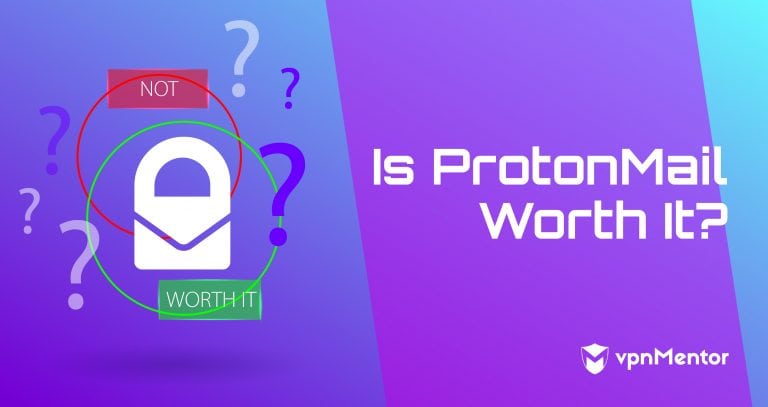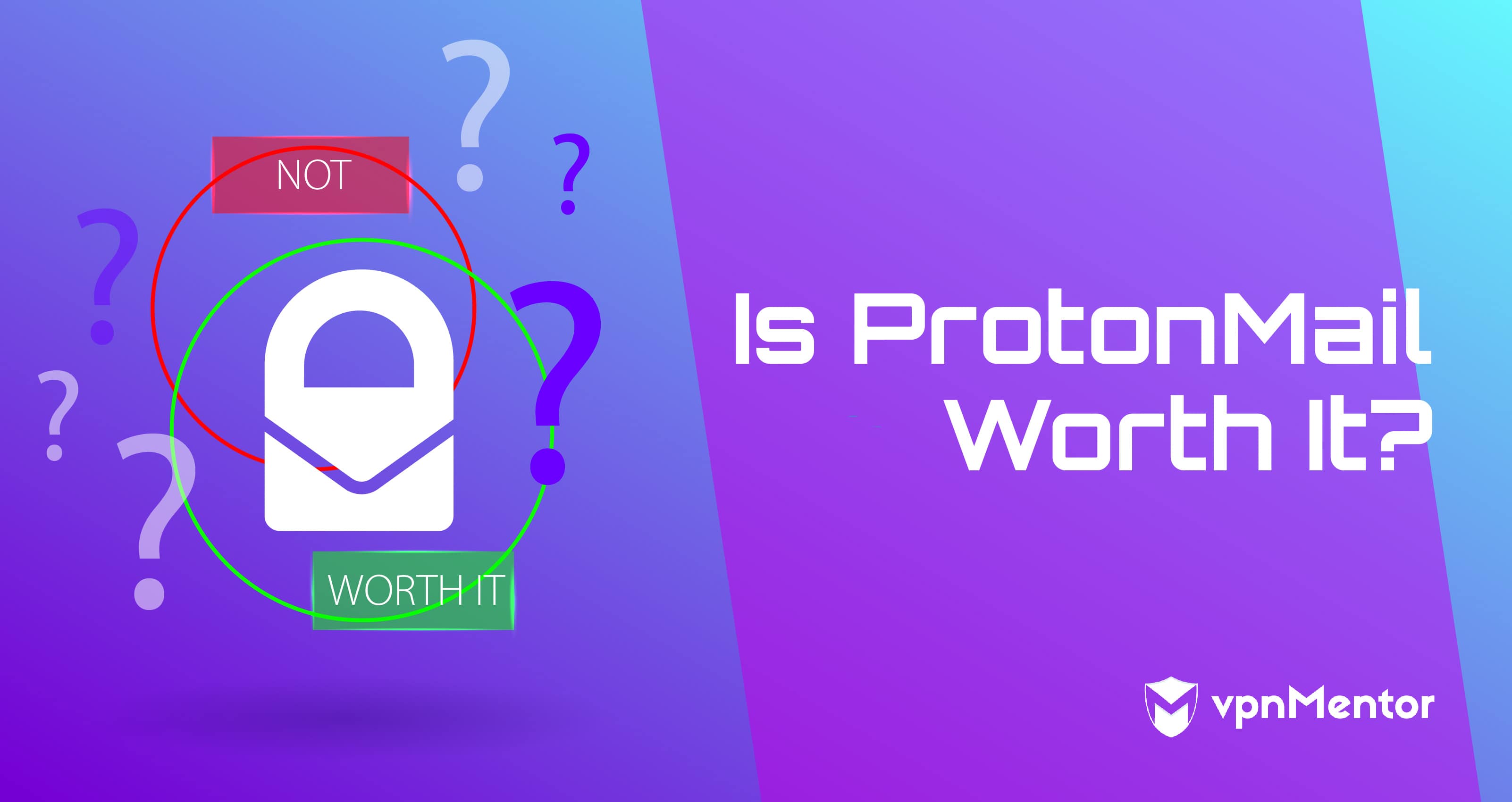ProtonMail Review 2025: Is It Really Worth Your Money?
How safe are the e-mails you send to colleagues and friends? In a sense, the content of your e-mail messages is always being monitored. ProtonMail was designed to keep user content beyond the reach of government agencies and advertisers.
Their approach to encryption even prevents ProtonMail itself from reading what it sends and stores for you.
There may not be an actual human being spying on you when you use a familiar e-mail client. But there's a reason why these services are free. E-mail clients are designed to extract keywords from your conversations and use them to choose targeted ads for you.
Aside from this, there's a real danger of more malicious spying. The setup of ordinary mail clients creates vulnerabilities that can be exploited by hackers and government agencies.
Messages sent with those clients are rarely encrypted. And even when they are, it is typically just while they're being sent. When they're just sitting on the e-mail provider's server, they can easily be read by anyone who gains access to that server.
ProtonMail was designed to provide an alternative to this model. It was launched by employees of the European Organization for Nuclear Research (CERN), specifically in response to news about the National Security Agency's (NSA) data collection activities.
Read on to understand more about how ProtonMail works and to find out whether you should use it.
How Does ProtonMail Work?

The main selling point for this e-mail client is end-to-end encryption. This means that when you type a message in ProtonMail and click "send," its content is scrambled to make it unreadable.
The only way to make that readable again is with the correct encryption key. And only the devices belonging to the sender and the intended recipient have that key.
Messages sent between two ProtonMail users are automatically encrypted using the recipient's key, so they can be opened as soon as the user logs in.
But ProtonMail can also be used to communicate securely with users of other e-mail clients.

All you have to do is set a password for your encryption key and give it to the intended recipient. Then, they only need to put in the password to open your message through their normal inbox. Until they are decrypted in this way, the messages are not readable.
If this doesn't seem like enough security, you can set ProtonMail messages to self-destruct. After a period of time specified by you, the encrypted message will be deleted from the company's server.
Afterward, it can no longer be accessed from either the sender's or the recipient's device. This eliminates any danger of the content falling into the wrong hands.
But that danger is already negligible since ProtonMail messages remain encrypted for as long as they are stored on ProtonMail's servers.
Those servers also boast excellent physical security. According to ProtonMail's website, the client's infrastructure "resides in Europe's most secure datacenter, underneath 1,000 meters of solid rock."
As well as being physically protected and digitally encrypted, users' data is also legally protected.
Swiss Privacy Laws: Some of the Strictest in the World
ProtonMail is based in Switzerland, home to some of the strictest privacy laws in the world. This puts it beyond the legal reach of both the United States and the European Union.
In the unlikely event that the Swiss government obtained a court order for data on ProtonMail's servers, there wouldn't be much to see. Without the individual users' encryption keys, there is practically no way for authorities to decipher what's in your messages.
Why Should I Use ProtonMail?
There are a lot of reasons why you might want your e-mail messages to be thoroughly encrypted. And not all of them involve having something to hide.
It's sensible to be worried about intrusions into your private life. Maybe you're worried about governments collecting data on their citizens. Maybe you don't want giant internet companies to develop increasingly detailed advertising profiles for you.
These concerns might encourage some e-mail users to apply encryption to everything they send and receive.
But other people might only want to use ProtonMail to add security to messages with sensitive information or a lot of personal details. These could include e-mails about legal matters, financial transactions and banking, medical information, or high-level professional conversations.
Better for Businesses
ProtonMail specifically recommends using its professional-tier service to set up multiple addresses for organizations that need to communicate sincerely.
It notes that e-mail encryption is an ideal tool for complying with "stringent privacy and security regulations, such as the Health Insurance Portability and Accountability Act."
Furthermore, it's an effective method to ensure that confidential information doesn't fall into the hands of individuals who aren't obliged to comply with the company's non-disclosure agreement.
If these professional applications of the service seem useful, you can access ProtonMail's advanced features at an affordable rate that provides you with five e-mail addresses and five gigabytes of storage on the Swiss servers.
But if you only need to encrypt occasional, particularly sensitive messages, there is a free version of ProtonMail that provides one address and 500 megabytes of storage.
Is it Worth Paying for ProtonMail?
With so many free e-mail clients available, it might seem strange to pay for such a service. This is especially true when you realize that the ProtonMail interface is not exactly better than the other alternatives.
But of course, when you subscribe to ProtonMail, what you're really paying for is privacy, security, and peace of mind. This probably doesn't seem so strange.
As mentioned above, traditional e-mail clients are all ad-supported. They rely on harvesting your data and using it against you.
ProtonMail is one of the only companies offering an alternative, and it is arguably the best. That is something that's worth supporting.
And since there's a limited version that's available for free, you can be sure that ProtonMail's is sincerely committed to providing the best security to everyone who needs it.
When you subscribe to ProtonMail Plus, you're showing support for that mission. You're also helping the company to grow and improve the quality of its secure e-mail client.
Downsides of ProtonMail
Since it launched in 2014 after a successful crowdfunding campaign, ProtonMail has been steadily adding features and improving user experience. This pattern is sure to continue.
There are still some wrinkles to iron out. The search feature is limited, and the spam filter is imperfect. There is a rich text editor for HTML and images, but no option to save templates or add recommended text and addresses.
The service is available on mobile apps, but these don't group messages into conversations and aren't quite as attractive as the web version. None of these shortcomings ruin the experience of sending or receiving e-mails, but they might frustrate some users who are used to the more well-established e-mail clients.
Still, none of this should be as frustrating as knowing that your e-mails are being read by algorithms and turned into adds. With traditional e-mail clients, you're powerless to stop that.
ProtonMail gives you back the power to control your own written communications online. That's probably worth a few dollars a month.
Why You Still Need a VPN with ProtonMail
Our Top Pick: ExpressVPN
Editor's Note: Transparency is one of our core values at vpnMentor, so you should know we are in the same ownership group as ExpressVPN. However, this does not affect our review process.

Tested April 2025
ProtonMail may be more secure than an average Gmail box, but it only encrypts the emails themselves. The best way to ensure that your data stays private is to pair ProtonMail with a trustworthy VPN. ExpressVPN is a premium VPN committed to user security.
When you pair a VPN with a secure email address, you'll add an extra layer of security to your activity. ExpressVPN uses military-grade encryption to keep your whole connection safe, not just your emails. When you use a regular internet connection to send and receive messages, there's a chance that they can end up in the wrong hands. VPNs prevent this by funneling user data through a secure channel. Your messages won't touch public servers. Instead, all of your internet activity will be routed through ExpressVPN's private servers. To keep your data from leaking, it also uses DNS leak protection technology.
Its other privacy measures include a very strict, no-logs policy and an automatic kill-switch. With over 3000 servers ExpressVPN is the best all-around option when it comes to privacy and security.
Thanks to its money-back guarantee you can try ExpressVPN risk-free for 30 days to find out why users love it so much.
Further Reading
See our review for Proton VPN for more information on the company behind ProtonMail.
Read our guide to learn more about encryption.
What does Google really know about you? Read more here.
Your data is exposed to the websites you visit!
Your IP Address:
3.17.182.90
Your Location:
US, Ohio, Columbus
Your Internet Provider:
The information above can be used to track you, target you for ads, and monitor what you do online.
VPNs can help you hide this information from websites so that you are protected at all times. We recommend ExpressVPN — the #1 VPN out of over 350 providers we've tested. It has military-grade encryption and privacy features that will ensure your digital security, plus — it's currently offering 61% off. Editor's Note: ExpressVPN and this site are in the same ownership group.





Please, comment on how to improve this article. Your feedback matters!